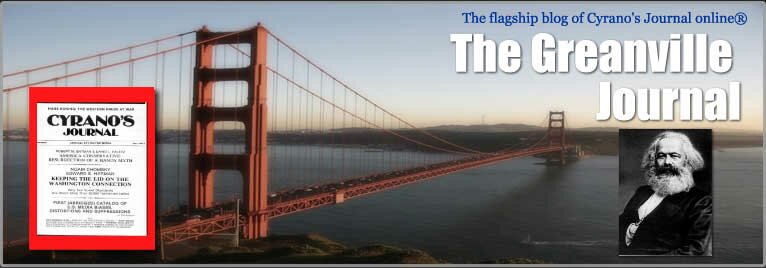‘The Left’ Moves Front and Center
 Greanville
Greanville

In almost any country in the world this charming couple would be classified as simply “mainstream liberals,” centrists, but in America many insist on calling them leftists. The confusion—seeded in great measure by the zealots of the right—contributes a great deal to the troubles ordinary Americans have in sorting out what’s what on the political spectrum.
BY E.J. DIONNE Jr. | Dateline: JACKSONVILLE, Fla., Friday, June 22, 2007
Why can’t the left get any respect?
Whenever you use the word “left” in American politics, you feel almost compelled to add quotation marks. Today’s left is not talking about nationalizing industry, abolishing capitalism or destroying the rich. What passes for “left” in American politics is quite moderate by historical standards.
Still, cliches die hard, so you hear such 20-year-old questions as: “Are Democrats moving too far to the left?” or “Will Democrats abandon the center?”
This approach is about abstractions, not concrete political problems, and it misses the dynamic in American public life, which is the move away from the right and a discrediting of the conservative era. The political “center” of today is not where the “center” was even five years ago.
That’s why every leading Democratic candidate for president chose to appear at this week’s “Take Back America” conference organized by the Campaign for America’s Future, the leading group on the party’s progressive end. This included Hillary Clinton, whose roots in the centrist politics of the Democratic Leadership Council run deep. Clinton not only knows how much political energy there is on the left; she also knows where public opinion has moved, particularly on the Iraq war.
Clinton was booed at last year’s Take Back America conference when she said it was not “smart strategy” to set a date certain for withdrawing from Iraq. She was much better received this week for a tougher stand against the war.
Clinton was not just playing internal party politics. A large majority of the country has now decided that the establishment was wrong to support the war, and that those who opposed it — including the left — were right.
It’s like that on a lot of issues. Just a few years ago, the prevailing view held that national action for universal health insurance coverage was politically impossible. Now, pressure for comprehensive health-care reform is broad and deep, arising from major businesses as well as traditional liberal bastions. When two leading Republicans, former governor Mitt Romney of Massachusetts and Gov. Arnold Schwarzenegger of California, decide to embrace comprehensive health insurance coverage for their own states, it’s clear the winds are changing.
Economic populism is no longer marginal or antique. Frustration over growing economic inequalities, excessive compensation for executives, the privileged role of hedge funds and the disruptions caused by globalization are mainstream concerns. Newly elected Democratic senators as diverse as Jon Tester of Montana, Jim Webb of Virginia, Sherrod Brown of Ohio and Amy Klobuchar of Minnesota all sounded populist themes in 2006.
The most important sign that the center has shifted left (or, if you prefer, away from the right) is the behavior of Republican politicians who are thinking about their prospects beyond the Bush years.
Florida’s Gov. Charlie Crist, who succeeded Jeb Bush and is governing as a Schwarzenegger-style Republican moderate, had an approval rating of 70 percent in a recent Quinnipiac poll. As Jeremy Wallace of the Sarasota Herald-Tribune pointed out this week, Crist’s score is “higher than the peak ratings for Jeb Bush, who was thought to be the model of popularity at the end of his eight years.” Crist’s politics reflect the center’s drift.
In the Senate, it’s Republicans up for reelection in 2008 who were among the first in their party to oppose George W. Bush’s policies on Iraq. The contrast with the recent past could not be plainer: In 2002, Democrats fearful of losing reelection tried to minimize their differences with the president. Republicans in political trouble are now trying to highlight theirs.
None of this means that the country would replace the fiercely ideological politics of the right with strident leftism. On the contrary, the reaction against conservatism is being fed by two streams — a move left by one part of the electorate, and a frustration with ideological politics altogether by another part.
It’s why New York Mayor Michael Bloomberg, flirting with an independent run for the presidency while denying he’s doing so, hit a responsive chord when he declared this week that “good ideas should take precedence over rigid adherence to any particular political ideology.”
But the “good ideas” that voters are demanding mostly have to do with problems that have been framed by the left, not the right: the need to disengage from Iraq, to create health security, to ease economic inequalities. It’s time to update our sense of where the political center lies and to adjust our view of “the left” accordingly.

E.J. DIONNE Jr. writes an opinion column for the Washington Post. His views normally articulate a “liberal” vision of society and history.
Posted in Controversy, Establishment Whores, The Left & Pseudo Left | 

23 June 2007 at 9:29 PM
Good and thought-provocative read. But why must liberals like Dionne always resort to left-baiting, even when making a case for a leftwing type of politics? Dionne apparently has trouble telling his audience that the selfish, bankrupt right is and has been opposed by left positions which are both sensible and humane. No, he has to label the left, the “strident left.” What is Dionne afraid of? Why must they always throw some mud on the left to be seen as “balanced”? What a crock that is, and Dionne is intellingent enough to know it.